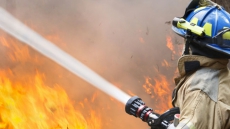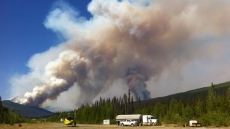VANCOUVER — Smoking marijuana containing low levels of the drug's main psychoactive ingredient does not increase most drivers' risk of a crash even though Canada's impaired-drug laws would penalize them, says the lead investigator of a study that analyzed THC amounts in the blood samples of more than 3,000 people who were injured behind the wheel.
Dr. Jeffrey Brubacher, associate professor in the department of emergency medicine at the University of British Columbia, said the findings apply to THC levels of less than five nanograms per millilitre of blood.
Changes to the Criminal Code when marijuana was legalized last fall set the legal blood drug concentration limits for THC so drivers with two to five nanograms in their system face a maximum $1,000 fine.
Brubacher, a toxicologist who is also an emergency room physician at Vancouver General Hospital, said blood samples taken between 2010 and 2016 at seven trauma centres as part of clinical care were used for a broad spectrum of analysis measuring THC, other recreational drugs, such as cocaine, heroin and amphetamines, as well as sedating medication.
The findings, published recently in the journal Addiction, show alcohol is the biggest factor in impaired-driving crashes, followed by recreational drugs, such as cocaine, heroin and amphetamines, which increased crash risk by 82 per cent. Other drugs including sleeping pills and antidepressants hiked the risk by 45 per cent.
"The complicated factor is people who use it (marijuana) medically or recreationally every day, they will have small levels in that two to five (nanogram) range," Brubacher said. "They can have those levels days after they last use because it accumulates in the fat.
"The upside of having the low (legal) limits is that they set a very clear message: If you're going to smoke pot, don't drive."
It's possible the impact of cannabis may increase if legalization means more people drive after using cannabis, says the study, which also included the universities of Victoria and Toronto, Dalhousie University in Halifax and the Centre for Addiction and Mental Health.
"It is also important to caution that the risk associated with cannabis may be higher in young drivers, who have a high crash risk at baseline, or in inexperienced cannabis users, who may be less able to compensate for cannabis-induced impairment," it says.
Brubacher said how long the drug lasts in someone's system depends on the dose, the form in which it is taken and what it was mixed with, making clear guidelines difficult when compared with alcohol.
"With co-use of alcohol and cannabis all bets are off when you do that. If you use the two together you're going to be impaired and your risk is going to go up," said Brubacher, adding impaired drivers tend to get into worse crashes that result in more serious injuries and sometimes death.
Chief Const. Mike Serr of the Abbotsford Police Department, who is co-chair of the drug advisory committee for the Canadian Association of Chiefs of Police, said more studies are needed to provide a clear idea of how much cannabis affects people's ability to drive.
"If someone has smoked a joint and they're clearly able to communicate and operate a vehicle then typically that is not going to come across our radar," he said.
Police are waiting for a roadside device that would go beyond testing for the presence of marijuana in a driver's saliva to providing a precise amount, Serr said.



